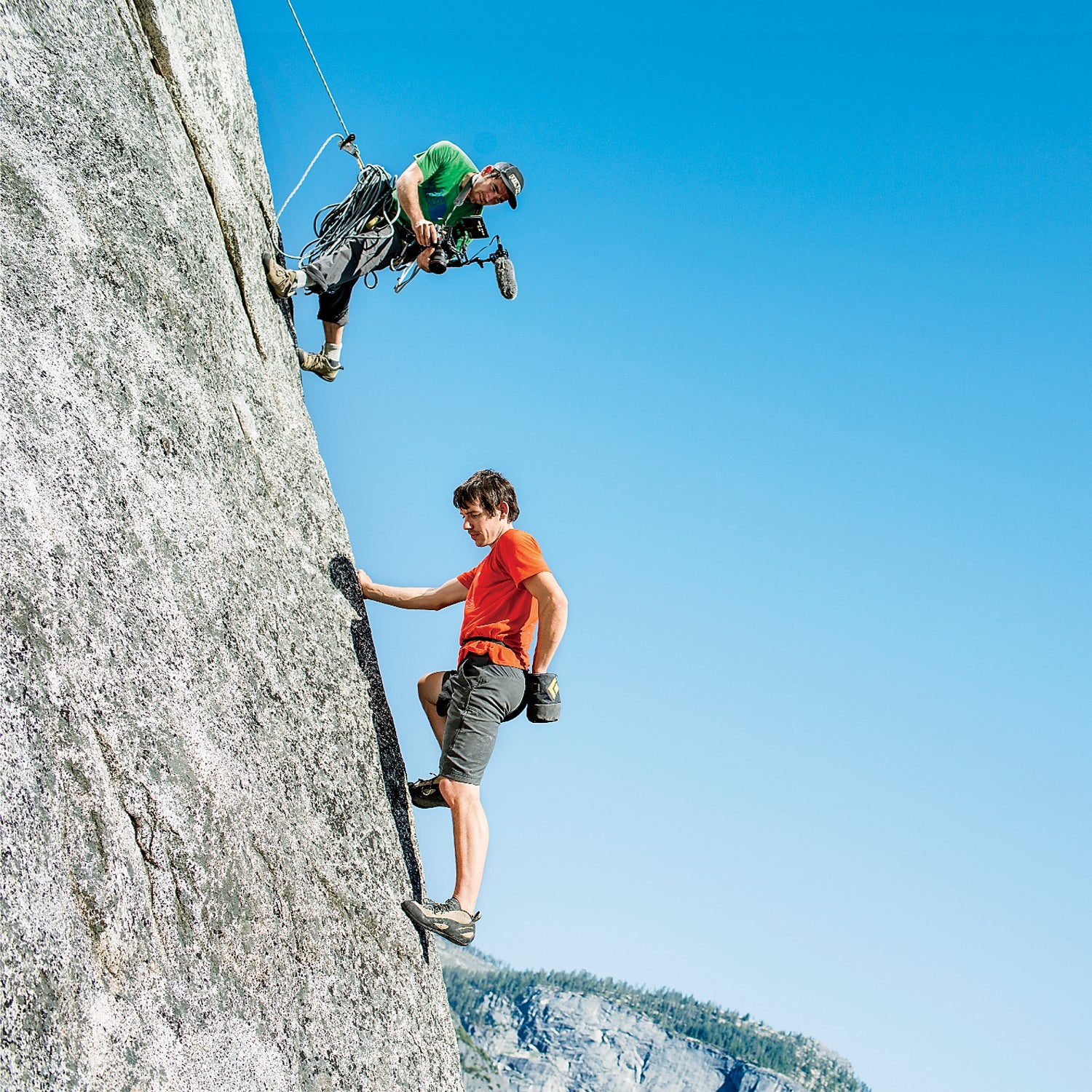Last week, Clif Bar, the California organic energy food company, dropped five climbers from its athlete team, including the sport’s biggest name, Alex Honnold, the 29-year-old best known for his daring unroped ascents of huge walls. The news, first reported by Rock and Ice, came as a surprise within the climbing community. After all, Clif’s logo is a climber hanging off a rock wall.
According to an anonymous source cited by Rock and Ice, the decision was in response to a new documentary, Valley Uprising, that chronicles the rebel spirit of climbers in Yosemite National Park over the past 50 years. Clif sponsored the film, which features all five of the dropped athletes: Timmy O’Neill, Steph Davis, Dean Potter, Cedar Wright, and Honnold. Among other things, Valley Uprising celebrates free soloing (that is, climbing without a rope) and BASE jumping, two of the sport’s most dangerous activities.
As news of the firing rippled across the outdoor industry, reactions to Clif’s seemingly abrupt move were mixed. Many observers noted that while the company’s timing was ill-advised—Valley Uprising is currently making the rounds at film festivals—the decision was not stunning. “They’ve always been uncomfortable with free soloing and BASE jumping,” Steph Davis told me. With outdoor athletes embracing increasingly risky endeavors, it was only a matter of time before a leading brand said enough is enough.
Of course, companies have been sponsoring dangerous endeavors for as long as people have been doing them. Eddie Bauer and Rainier Beer sponsored the first American Everest expedition in 1963, and daredevils have been hawking products on television since the 1980s. What has changed is the level of risk that athletes are willing to accept. There’s a major difference between laying siege to a mountain with all manner of gear and scaling a thousand-foot granite wall without a rope.
“It's like: We've been sponsoring these prominent athletes for years, we have a climber on our logo, and we just discovered they're doing something we aren't comfortable sanctioning?”
When Clif decided it was no longer comfortable with the latter, many within the climbing community lashed out. Facebook feeds and the message boards at SuperTopo, the sport’s most popular online forum, quickly filled up with angry messages: “Boycott Clif!” “Maybe Red Bull would pick them up.”
On Thursday, in an effort to clarify its actions, Clif released a “Letter to the Climbing Community.” In it, the company apologized for its handling of the decision but firmly pronounced that it would no longer be supporting BASE jumping, free soloing, or slacklining. “We no longer feel good about benefitting from the amount of risk certain athletes are taking,” the release read.
Two of the climbers, Wright and Potter, told me that, as part of the decision, Clif had offered to pay next year’s salary in exchange for nondisclosure agreements. (Clif declined to comment on the matter.) Shortly after it dropped the athletes, Clif awkwardly attempted to rehire at least one of the climbers, Wright, who isn’t primarily a free soloist and is better known as a traditional and big-wall climber. He declined the overture. “If your girlfriend dumps you and then wants to get back together with you,” he emailed me, “she isn’t that loyal, and you can probably do better.”
When I spoke with Potter, an elite climber known for wingsuiting off peaks, he referred to whole the whole deal as “plain sleazy” and accused the company of hypocrisy for backing Valley Uprising while dropping the film’s stars. His girlfriend, Jen Rapp, the former head of publicity for Patagonia, questioned Clif’s timing. “Why would a company do this when it's going to get a lot of attention?” she said. “As a publicist, I’m like, what are you thinking?”
Multiple people told me they suspected the decision was abruptly handed down by Gary Erickson, Clif’s founder, who recently watched Valley Uprising at a San Francisco premiere. But in an email, Clif Bar senior director of brand experience Jeff Johnson denied that, saying it had been in the works for a year. “We recognize that the timing of the decision was not ideal in terms of the film’s airing,” he wrote. “The final decision-making timing was a result of our annual athlete sponsorship evaluation process, which happens every fall.”
Even so, many observers are still scratching their heads. “It was as if somebody who had a lot of influence for the first time paid attention to their marketing campaign,” says Jimmy Chin, a North Face–sponsored climber and filmmaker who shot a commercial featuring Honnold for the website company SquareSpace that aired during the World Series. “It’s like: We’ve been sponsoring these prominent athletes for years, we have a climber on our logo, and we just discovered they’re doing something we aren’t comfortable sanctioning?”
The public disavowal of danger by a major company also has some professional outdoor athletes concerned about their futures. “It’s kind of unnerving to see a big brand move away from such high-risk adventures,” says kayaker Chris Korbulic, who is sponsored by Eddie Bauer, among other brands. “I hope it won’t set a precedent for the rest of the outdoor industry.”
Others are less worried. Chin, who has a unique perspective as both a sponsored athlete and a commercial filmmaker, told me he saw the Clif news as a blip that won’t disrupt business. “Risky activity has kept people’s imaginations and inspired people for a long time,” he said.
Indeed, when it comes to the mainstream media, high-flying outdoor sports have never been more en vogue. 60 Minutes has covered everyone from Honnold to Potter to wingsuiter Jeb Corliss, and outdoor athletes of all stripes have become increasingly popular among corporate brands looking to capitalize on their cachet. CitiBank tapped Honnold for a commercial. Ski mountaineer Chris Davenport is featured in a Wild Turkey campaign. Mountaineer Adrian Ballinger has appeared in an iPad ad.
Clif Bar, however, isn’t a major corporation looking to up its adventure cred. The company has seen tremendous growth over the past few years and, as with a lot of the major energy food manufacturers, you can now buy its bars in 24-packs at Costco. But it remains a progressive business lauded for environmental stewardship and its treatment of employees. (The company has has appeared near the top of Outside’s Best Places to Work list several times.) Clif’s choice to walk away from popular if arguably reckless stars seems like an attempt to steer away from the thrill seeking endorsed by the Red Bulls of the world. “We’re drawing a line for ourselves,” the company wrote in its open letter to the climbing community. “We understand that this is a grey area, but we felt a need to start somewhere and start now.”
“I’ve spent time with these guys, including Gary,” says David Vinjamuri, an adjunct professor of marketing at New York University who wrote about Clif in his 2008 book, Accidental Branding: How Ordinary People Build Extraordinary Brands. “They’re not impulsive people. They’re very connected to this community and take it really, really seriously. My guess is they had a difficult conversation about whether the risks of cutting ties to part of the community outweighed the possibility that they were going to promote what they saw as a dangerous role model for average climbers.”
Vinjamuri’s assessment made me think of a day in Yosemite this past summer, when I was reporting on Valley Uprising. A college-age fan of Honnold’s on crutches approached the climber at his van. The guy had a split lip that resembled a beaten plum. He’d recently fallen off one of Yosemite’s walls. “What was the first route you ever free soloed in Yosemite?” he asked. Honnold hemmed and hawed, didn’t share the route, and gave the kid some general encouragement, along with a selfie. It was kind of awkward, but Honnold did the right thing. All evidence suggested this kid was not a star free soloist in the making. I’ll bet he ate Clif Bars though.


